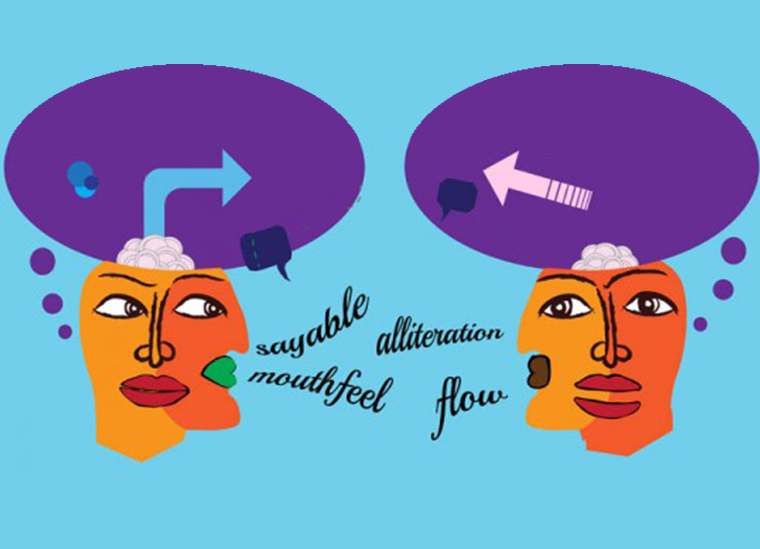“Windowsill. . . . Piccadilly Circus. . . ” every time I see those words, I also hear them in my mind being said by the eccentric and endearing fairy godmother-like character (played by Estelle Winwood) from the 1955 movie, The Glass Slipper. She loses herself in the sound of saying and repeating some of her favorite words.
What she so wonderfully describes in one of her quirky, off-topic rants is what we in the branding and nomenclature world might describe as “mouthfeel” or how satisfying (or not) it feels to say and, some would say, experience a word or name as one says it. It has everything to do with flow and ease of pronunciation, but is basically the combination of rhythm, correct stress, and intonation. Of many branding guidelines that we share with our clients and try to follow as we develop names, mouthfeel is one of the most important yet tough-to-grasp concepts.
Why It’s Important To Your Brand.
Because an important element of developing a brand name is choosing a word (or words) which is not only easy to remember, but satisfying to pronounce, mouthfeel is more meaningful than you might think. Words that are cumbersome and awkward to say may cause word aversion or a even a negative connotation.
We recently conducted the brainstorm workshop portion of our 180 Positioning Process for a growing and changing educational program of a well-respected international organization. This organization and their people are inspiring. They are so clear about their goals, so committed to their purpose, and yet from the information available on-line, the brand is just adequate and kind of boring, not representative of the incredible things they are doing in the world.
One of reasons this organization engaged us is to explore renaming as well as rebranding for one of their important programs. The current name doesn’t effectively reflect what they do and is somewhat cumbersome and outdated. Also, their role is expanding and the name simply doesn’t work anymore. They have the added challenge of needing to appeal to or translate well to international audiences, so we have our work cut out for us.
When we got to discussing the idea of mouthfeel, it resonated particularly with our audience made up of a diverse group of people whose first language predominantly was not English. They immediately embraced the concept and understood how important this would be in the ultimate name of choice.
A Great Conversation
A Way With Words, a public radio program about language, likens mouthfeel or the sensation of saying a word to how one might describe winetasting. Is there a term for the way words feel when they’re spoken that has nothing to do with their meaning? The word “suitcase” feels nice to say, unlike rural. “Cellar door” certainly has a different quality than “moist ointment.” Hear a great conversation here.
http://www.waywordradio.org/mouthfeel-of-words/
On the accompanying discussion forum there were some additional great comments. One referred to how a word’s sound can have “palatability” and referred to an old Monty Python clip where the actors in the sketch are talking about the way different words make them feel (to hilarious effect).
“Word aversion” is the term linguists use to describe the visceral reaction some people have to words that really bother them. Word aversion can be caused by a word’s meaning, mouthfeel, the connotations associated with a word, or a mixture of all of the above.
Not surprisingly, many hated words have to do with bodily functions (the meaning). Ben Zimmer, a linguist and executive producer of vocabulary.com talks about certain vowel sounds like “oy” in moist (which, by the way, is unofficially the most universally hated word according to Zimmer), “uh” like in puss or crud and “ew” sounds, like in mucus are all found in words that commonly cause word aversion. All things that businesses, products and organizations should be very cognizant of when naming and branding.
One thing that may attribute to mouthfeel and word aversion is the way we process speech. Recently, a study at UCL, as reported in The Guardian, found that our brains separate words from intonation. Whenever we listen to words, “words are shunted over to the left temporal lobe [of our brain] for processing, while the melody is channelled to the right side of the brain, a region more stimulated by music.” Our brains use one area of the brain to identify the mood and another to identify the actual meaning of the words.
Coming up with a name is a vital aspect of the branding or rebranding process. It’s important to keep things like mouthfeel, any baggage or connotations which may come along with the word, and the possibility of word aversion top of mind.
updated October 2015
— Wendy Baird, Principal and President


Leave a Reply